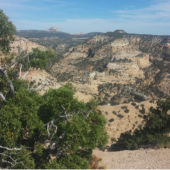
Climate change is a difficult subject to teach because it requires complex scientific understandings and is connected to personal beliefs (Spence, Poortinga & Pidgeon, 2012). It is important to teach students the science of climate change and impact their personal beliefs to produce behavior that will mitigate climate change. In this study pre and post surveys focusing on climate change understanding, belief, and behavior were administered. Interviews were also conducted. The quantitative and qualitative data were conflicting, but through triangulated data analysis learning design elements promoting Climate Change Literacy in higher education were identified. A conceptual model was developed with the learning design elements to improve the teaching of Climate Change Literacy. Findings depicted three design elements that increase students’ Climate Change Literacy: 1) Decreasing students’ psychological distance from climate change, 2) Utilizing students’ sense of place, and 3) Student investigation of their own research questions. Increasing students’ Climate Change Literacy is the critical first step in making sustainable societal transformations required for mitigating climate change, our most pressing environmental issue that impacts all people and the natural environment (Spence, Poortinga, & Pidgeon, 2012).
Continue ReadingColleges and Universities around the U.S. have quietly invested in campus agricultural projects (CAPs) as interdisciplinary space for sustainability and food system education. In 2009, the College Sustainability Report Card showed that 29 percent of college campuses had some sort of campus farm or garden (Sustainable Endowments Institute, 2009). Agricultural education is no longer limited to traditional land grant research farms. CAPs have emerged in small and large, vocational and liberal arts institutions; but what role do these programs truly play in educating future farmers and food system professionals? Is preparing students for a career in the food system a goal of the relatively young campus agriculture movement? If so, what are the educational objectives and the pedagogical process for achieving them? Using qualitative and quantitative analysis of a regional inventory and a national survey, this article explores the themes associated with the campus agriculture movement and calls for a greater focus on the direction and purpose of campus agricultural education.
Continue Reading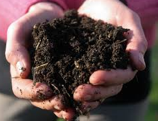
This personal narrative illustrates the role composting has played in the author’s connection to place throughout her adult life, and informs her scholarship today. Over the past twenty-something years she lived in close to twenty different homes, and yet always found space and time to create a compost/planting pile. The outcome is that between her efforts, kitchen scraps, and dishwater the soil gained fertility, and she too connected more deeply with each element. The essay proposes that home and community composting practices can inform our view of learning, shift educational paradigms, and help address the complex environmental and social concerns we face today.
Continue Reading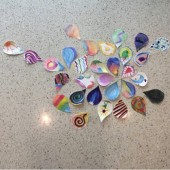
Abstract: Integrating contemplative methods into discussions of sustainability can create a sense of hope and agency in our students. In this case study, I present four tools that I use in my upper-level undergraduate/graduate seminar to engage students more deeply in reflection on topics in environmental ethics.
Continue Reading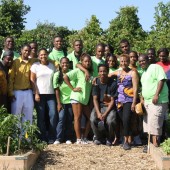
This case study describes the Cook County Green Corps program, a green job training program serving African American young adults from a low-income neighborhood. The program was implemented by an interdisciplinary organizing team to build knowledge, skills, and participation in sustainable jobs and urban agriculture among young adults. The trainees’ experience was documented by a program evaluation survey, environmental knowledge survey, and 1 year reflection interview. We summarize the experiential design, implementation and evaluation of the program. We discuss the limitations and the benefits of the program for trainees and the neighborhood. We share recommendations for future green job training programs that can best serve urban neighborhoods.
Continue Reading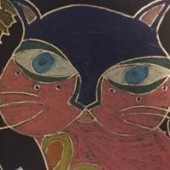
I wouldn’t want to try and mimic the elegant, eloquent and erudite arguments that every one of our authors makes for the unsurpassable power of experience in the educational process. In my own discipline, the Biological Sciences, I need look no further than the unstoppable force of the teaching laboratory, to know this truth. How do we get people to change, to do the right thing, to quit smoking, to wear seat belts, to learn something as complicated as heart surgery or sequencing DNA. How do we teach people to become outstanding members of society concerned about improving everyone’s quality of life: we can try teaching it a million different ways, but until they actually do it, the change has yet to happen!
Continue Reading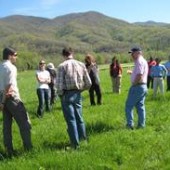
Sustainability Education is intended to provide learning, training, and practical experience, in both formal and non-formal settings, that fosters personal development, community involvement, and action for change in our human and natural worlds. Grounded in our experience of the world, Sustainability Education must mirror both the patterns present in our natural environment and the conditions present in our human society with the intention of preparing us for uncertain and rapidly transforming world conditions. Nature is the source of our identity as living beings and society the medium for expressing this. The conditions and needs for our survivability as a species and society will change depending on circumstances and through events that may be outside our control. Our success will depend upon our ability to respond in ways that value personal initiative, responsibility, creativity, commitment, and collaboration with others.
Continue Reading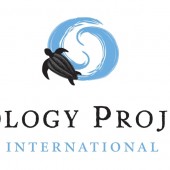
Ecology Project International (EPI) is a non-profit organization dedicated to developing place-based, ecological education partnerships between local experts and high school students to address critical conservation issues. This photo essay depicts local students in action at EPI’s programs in Baja California Sur – Mexico, the Galapagos Islands – Ecuador, and the Greater Yellowstone Ecosystem. The photos show students engaging in field science, applied conservation, and sustainability-related activities geared toward helping them develop environmental literacy.
Continue Reading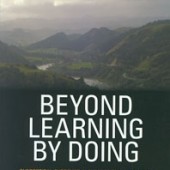
eview of Roberts. J. W. (2012). Beyond Learning by Doing: Theoretical currents in experiential education. New York, NY: Routledge. 129 pages. ISBN 978-0-415-8828-8
Continue Reading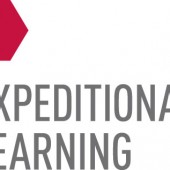
Millions of youth in the United States today are mandated to go to “work” daily. Indoor spaces, hard, plastic seats, and inauthentic menial tasks characterize their workplace. In a time in which the life support systems of our planet are imperiled and more humans are living in communities of poverty and violence, there exists an absurd disconnect between how education is currently practiced and the education that is needed to facilitate deep cultural revolution. Our teachers are taught to teach using the same irrelevant pedagogies, sitting in rows inside institutions of higher learning, taking notes, and memorizing disconnected facts for regurgitation on multiple-choice exams. My argument is that we are not going to be able to implement any true attempts in sustainability education without concomitant change in the way we teach teachers. While publicly funded schools still provide an equalizing agent to potentially provide opportunity for all children regardless of their race or social class, no school can truly educate children to meet the coming demands of our time without experiential teacher education. Expeditionary Learning, a national reform model for public schools, creates lasting change in the praxis of teaching by creating opportunities for teachers to learn in a different way than they have often been taught as students themselves. With continued coaching when they return to their classrooms, teachers are able to create learning environments embodying inquiry and authenticity so that our youth are empowered to affect societal change.
Continue Reading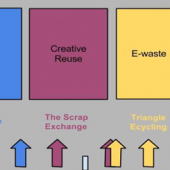
Sustainability capstones at UNC-Chapel Hill use the environmental capstone model—senior team projects for clients—to tackle problems with clear social and economic dimensions in addition to environmental. As one of a set of applied-learning course options in sustainability education, capstones draw students into data-driven and policy-relevant research and development, and generate useful products for campus and community clients.
Continue Reading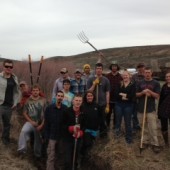
PDF: BrookeMoranSpring2013 Abstract Engaging employees in social and environmental sustainability initiatives “…can improve a business’ bottom line and help it reach its sustainability goals” (NEEF, 2011, p. 14). While some organizations may have sensed this years ago, most are only recently acknowledging how critical employee engagement is to their ultimate success. Presumably, this realization is […]
Continue Reading
Rick Medrick, one of the Guest Editors for this issue of JSE, puts out the call to “take back” our educational process to its origins, where, as beings of the earth, we experience things first and foremost as a way of finding out the truth and the beauty of the natural world. From those roots, he argues, we are sure to find our way to a sustainable future.
Continue Reading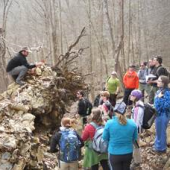
In this article I articulate what it means to understand curriculum as bioregional text. I utilize a theoretical mode of inquiry to explicate the values of bioregional education while integrating the discussion into the reconceptualized field of Curriculum Studies. The discussion addresses the value of direct experience, in our bioregion, and explains the significant contribution that can be drawn from developing a clearer understanding of our bioregional autobiography.
Continue Reading
Jack Turner (2005) once wrote “we treat the natural world according to our experience of it.” How are our students “experiencing sustainability” in U.S. colleges and universities? With the rise in popularity of education for sustainability initiatives in both K-12 and higher education, experiential education has been championed as a key pedagogical approach moving forward. Experiential curriculum projects come in many different forms. From outdoor education and service learning to so-called “hands-on” applied work on campus projects and field science research, students are increasingly “learning by doing.” Yet far from just another methodology to be used in the classroom, the rise of experiential approaches indicates deeper tectonic shifts in higher education. As students and faculty engage in this form of learning, questions are raised as to the historic divide between theory and practice, the separation between so-called “town” and “gown” cultures, the curriculum and the co-curriculum, and what forms of knowledge and skills are of the most worth to a 21st century graduate. This analysis first briefly surveys the theoretical history of experiential education before proceeding to consider two specific curriculum projects at the intersections between sustainability and experiential education—place-based learning and project-based learning. The analysis concludes with a discussion of the possibilities and limitations of current forms of experiential education in higher education and a consideration of future trends and developments.
Continue Reading
Environmental sustainability and justice and experiential education are present-day “buzzwords.” This case study of one secondary school Environmental Studies Program in Ontario, Canada problematizes the assumption that environmental knowledge(s), one form of experiential education, automatically leads to students acting pro-environmentally, querying: 1) how does environmental education impact secondary school students’ pro-environmental behaviours?; 2) to what extent does environmental knowledge inform environmental actions? Four primary themes emerged in one case study: a) strong sense of community; b) the evolving mission/vision in the program; c) the teacher’s evolving pedagogical praxis; and d) an increase in activist leanings in students. The role of the teacher on student learning, a discussion of emancipatory environmental actions, and educational policy implications are discussed.
Continue Reading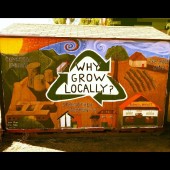
This paper will focus on a qualitative research project that occurred in the fall of 2011 at Chandler Gilbert Community College, which set out to better understand the learning process of experiential education by observing the comments and actions of students interacting in nature-based learning. The research study is based on the premise that students who develop a moral awareness of nature will better understand the core conceptual components of environmental sustainability. The main objective of this research project was to assess the transformational learning of students enrolled in PHI-216 Environmental Ethics courses who engaged in experiential learning to better understand environmental sustainability.
Continue Reading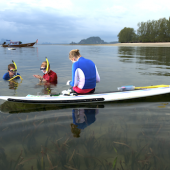
Understanding how we live (culture) and its impact on where we live (ecology) is one of the key issues facing sustainability and sustainability education. The International Sustainable Development Studies has developed a study abroad program for American college and university students in Thailand, “People, Ecology and Development” to address these issues through experiential studies of sustainability. Courses each semester focus on understanding the broader challenges of sustainable development through experiential studies of specific landscapes and cultures in the villages, mountains, coasts and islands throughout Thailand. This paper examines the key components of ISDSI’s programs, and provides a framework for understanding how these principles can be used to teach about sustainability within the broader context of issues of social justice and global learning more generally. Key components of the ISDSI approach include: community based learning — working with local communities to design courses that reflect community needs, knowledge and struggles; place-based learning — examining both the culture and ecology of specific locations, watersheds, bioregions, island archipelagos, etc.; experiential learning — learning through direct examination of and participation in the cultural practices (lifeways, norms, etc.) and study of ecological components (forests, coral reefs, etc.); and expedition based — learning during focused expeditions through the landscapes being studied, usually human powered (backpacking through remote mountain forests, sea kayaking between islands, etc.).
Continue Reading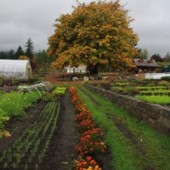
Field studies play an important role in curriculum at many levels. Within the Sustainable Leisure Management graduate program at Vancouver Island University (VIU), field studies play a critical role in allowing students to better understand the complexities of sustainability and innovation at the local/regional level. One particular course utilizes case studies as a research method and experiential education as a pedagogical philosophy, and in the 2012 edition highlighted by this article, the course examined sustainability and innovation on the Southern Gulf Islands of British Columbia, Canada.
Continue Reading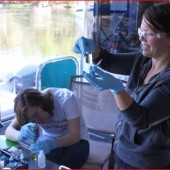
This paper presents a case study of an experiential learning project, an analysis of its transformative learning effects, and a description of the aspects most influential on transformative learning. The project is an eight-day houseboat excursion with students at the University of North Florida. Student work products were evaluated for evidence for transformative learning. The most powerful factors causing transformative learning were the experiential aspect of studying in the field, projects done strictly within a student’s major discipline, and extra-disciplinary projects done intentionally outside a student’s major discipline.
Continue Reading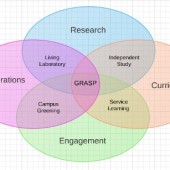
The current paper introduces and presents a preliminary pilot study of the Guided Research Applied Sustainability Project (GRASP) model for sustainability education. GRASP integrates curriculum, research, operations and engagement at the university level to create specialized projects that both engage students with real world issues and provide usable outputs for campus and/or community partners. Drawn from theory and practice in Education for Sustainable Development (ESD) as well as experiential education, the GRASP model includes five primary elements, which are the project topic (substantive issue being studied), groups (students working together), mentors (conduit between the instructional staff and enrolled students), assignment (pedagogical deliverable students submit for grade), and procedure (process of topic selection and project completion). GRASP was designed to enable implementation in both small and large courses at the undergraduate and/or graduate level and was tested in a large (200+ student) undergraduate Sustainability course. Projects included a campus sustainability audit and mixed methods analysis of documentary film campaigns. Survey data collected from students and mentors determined that the GRASP model is effective in providing students with a positive and engaging learning experience. Outcomes identified relate to attitudes and values as well as knowledge and skill attainment (e.g. teamwork, applied sustainability research). Suggestions include additional instruction on research methodology and greater clarification of project guidelines and mentor roles. The results of our pilot study reaffirm the potential impact of an experiential approach to sustainability education that incorporates multiple stakeholders from within the university campus and is scalable to large classes. GRASP is recommended as a model with which to meet these goals.
Continue Reading